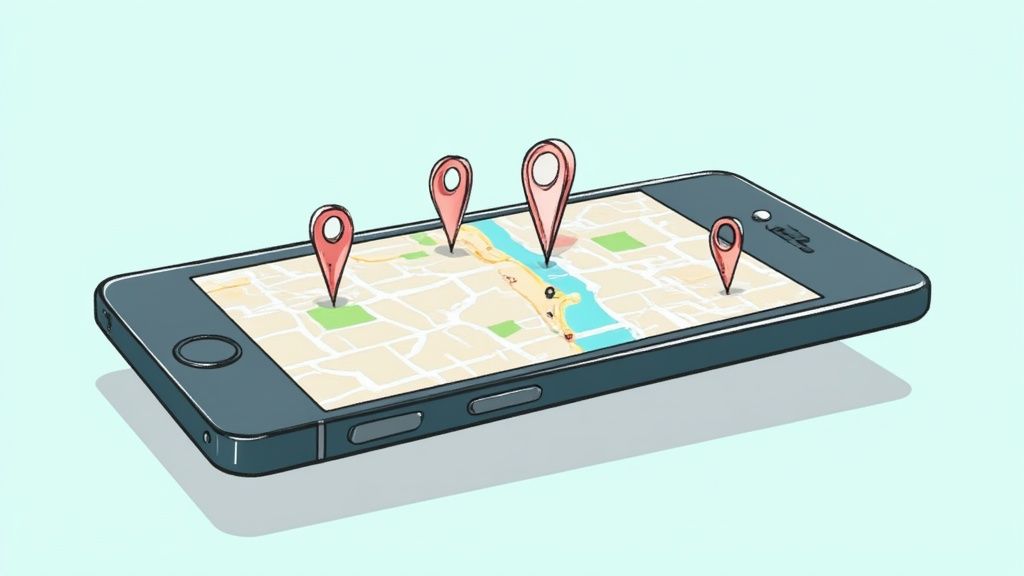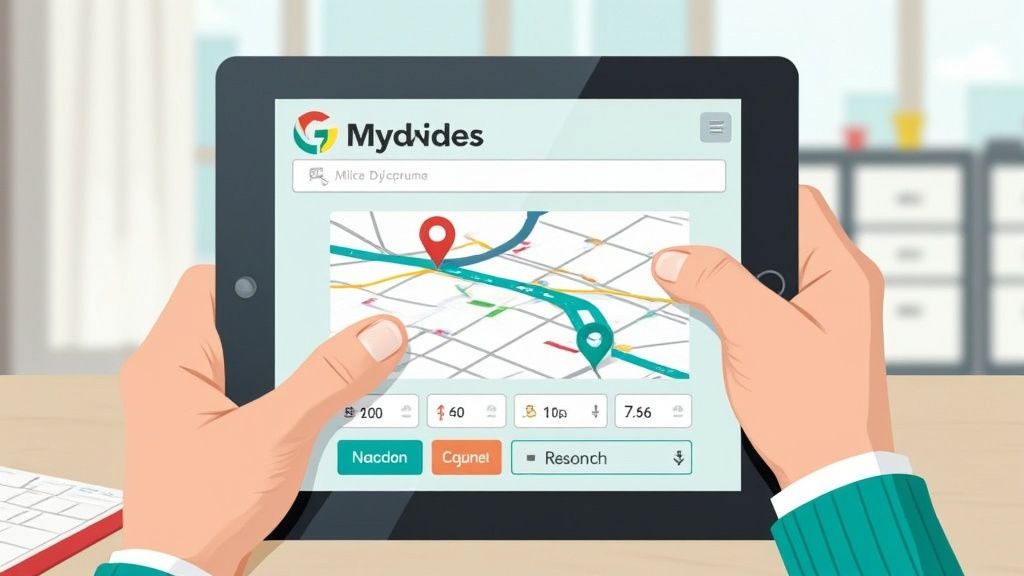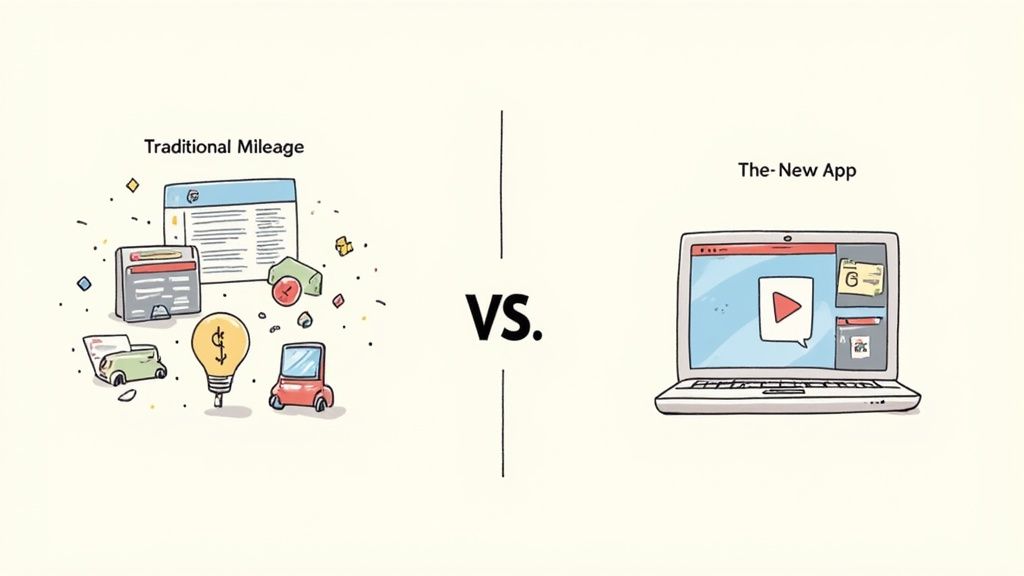
The Ultimate Guide to Finding the Best App That Calculates Mileage: Reviews and Recommendations
Understanding Modern Mileage Tracking Technology

The days of tedious manual mileage logs and odometer readings are behind us. Businesses and individuals now have access to powerful digital tools that automatically track and record travel data. These solutions save significant time while delivering much higher accuracy compared to manual methods.
The Power of Automation
Modern mileage tracking apps excel through their automatic logging capabilities. For instance, apps like Car Mileage - Auto GPS Tracker use GPS integration to record trips in real-time, capturing start and end points, distance traveled, and detailed route information. This eliminates hours previously spent on manual data entry. The app can automatically categorize journeys by route type, making it simple to organize mileage for tax purposes or work reimbursements. Users can also access stored trip history, analyze distance and cost data, and export detailed summaries.
Smart Categorization and Reporting
Many apps now include smart categorization features that automatically sort trips as business or personal based on set rules or learned patterns. This makes record-keeping much simpler and ensures accurate reporting for taxes and reimbursements. The reporting tools allow users to quickly generate custom summaries with key details like dates, times, mileage, trip purposes, and client information.
Real-Time Monitoring and Analytics
Advanced mileage tracking apps provide real-time monitoring and analytics capabilities. Businesses can track fleet locations and activities to optimize routes and improve operations. The real-time data helps with dispatching, logistics planning, and customer service. The analytics also reveal important patterns in fuel usage, driver behavior, and vehicle maintenance needs. This data-driven approach helps companies identify concrete ways to reduce costs and improve efficiency in their operations.
Maximizing Accuracy in Mileage Tracking Solutions
Getting accurate mileage records is essential for both personal trips and business records. While GPS tracking seems straightforward, real-world conditions pose several challenges that quality mileage tracking apps need to handle effectively. Common issues include signal disruption in urban areas between tall buildings and coverage gaps in remote locations.
Overcoming Tracking Challenges
One key challenge is balancing accuracy with battery life. Many phones restrict background app activity to save power, which can create gaps in mileage logs. The best tracking apps use smart algorithms that combine data from GPS, accelerometer, and other phone sensors to maintain precision while minimizing battery drain.
The Importance of Device Settings and Environmental Conditions
Your phone’s settings directly impact tracking quality. Location services must be enabled and set to high accuracy mode for the best results. Physical barriers like heavy cloud cover, dense trees, or tall buildings can also affect GPS signals. Understanding these limitations helps users take steps to maintain reliable records. Google Maps Timeline offers basic trip tracking through your phone’s location history, but it has limitations. While Timeline data stays current through automatic updates, factors like battery-saving modes can reduce accuracy. Many users pair Timeline with dedicated mileage apps like MileageWise to create IRS-compliant logs.
Optimizing Your Tracking Setup
Follow these key steps to get the most accurate tracking:
- Use high-accuracy mode: Enable GPS, Wi-Fi, and cellular data together for precise locations
- Adjust battery settings: Make sure battery optimization doesn’t restrict the tracking app
- Run regular calibration: Use app calibration features when available
- Check against known distances: Compare logged miles with measured routes periodically
- Keep apps updated: Install updates that improve tracking accuracy and performance
By addressing these core factors and following best practices, you can maintain reliable mileage records that hold up for business expenses and tax reporting. Taking time to optimize your setup pays off with accurate logs you can count on.
Navigating Features and Value Propositions

Selecting the right mileage tracking app comes down to finding the perfect match between features and cost for your specific situation. Taking time to evaluate your current needs while considering future growth will help you make a smart choice that delivers real value.
Essential Features in Free Mileage Tracking Apps
Free apps often include more useful tools than you might expect. The core features typically include manual trip logging, GPS tracking, and basic reporting capabilities. While entering trips manually requires more effort, it works well for occasional travelers just getting started. GPS tracking eliminates human error by automatically calculating distances. Most free versions also provide simple reports that break down mileage by date ranges.
Unlocking the Power of Premium Features
As your travel tracking needs grow more complex, premium features become more worthwhile. For example, apps like TripLog offer automatic mileage tracking that completely removes manual data entry. While their free version limits you to 40 trips per report with manual logging, the $5.99 monthly plan includes unlimited automatic tracking plus bank integration. TripLog’s MagicTrip and Plug-N-Go features can even detect trips automatically based on vehicle movement and Bluetooth connections.
Beyond automatic tracking, premium versions often include bank and credit card integration to streamline expense tracking and advanced reporting tools for detailed analysis and custom reports. You can learn more about mileage app pricing and capabilities at The Rideshare Guy.
Aligning Features with Business Needs and ROI
When deciding if premium features justify the cost, consider these key factors:
- Frequency of travel: How many business or personal trips do you take?
- Complexity of reporting: What level of detail do you need for taxes and reimbursements?
- Integration with other systems: Would connecting to accounting software save time?
- Business growth projections: Are your mileage tracking needs likely to increase soon?
Taking time to evaluate these elements helps you pick an app that fits your current needs while giving you room to grow. This practical approach ensures you get good value whether you choose free or paid features. The key is to assess the long-term benefits each feature provides for your specific situation.
Mastering Tax Compliance and Documentation
Maintaining accurate mileage records that satisfy IRS requirements can be daunting. Modern mileage tracking apps make this process easier by providing features that generate IRS-compliant logs and documentation. These tools help turn a complex task into a manageable one.
IRS Compliance: Key Features to Look For
The most important aspect of any mileage tracking app is IRS compliance. Look for apps that record essential trip details including date, time, start/end locations, trip purpose, and total miles driven. Features like automatic trip categorization help you quickly mark trips as business or personal. The app should also provide detailed reporting capabilities with exportable logs that meet IRS formatting standards.
Building Bulletproof Mileage Records
During a tax audit, thorough documentation is your best defense. Your mileage tracking app should capture all required information to support your mileage claims. Many apps let you attach supporting documentation like parking receipts, toll charges, and meeting notes. This creates a clear paper trail that demonstrates your careful record-keeping.
Streamlining Tax Preparation with Automated Reports
Manual report creation for tax purposes takes considerable time and effort. Quality mileage apps include automated report generation that compiles your mileage data into organized summaries. This saves time while reducing data entry errors. Look for apps that export reports in common formats like CSV or PDF to work smoothly with tax preparation software. When selecting an app, tax compliance features are critical. MileageWise works with Google Maps Timeline to convert location data into IRS-compliant logs through its web dashboard, where users can add trip details and ensure records meet requirements.
Workflows for Efficient Documentation
Follow these best practices to maintain organized mileage records:
- Categorize trips immediately: Label each trip as business, personal, charitable, or medical right after completion
- Add detailed notes: Record client names, meeting locations and other key details for business trips
- Attach supporting documents: Save receipts, invoices and related files with trip records
- Review reports regularly: Check logs periodically to catch and fix any missing information
With a tax-compliant mileage tracking app and consistent documentation habits, you can approach tax season confidently knowing your records are accurate and audit-ready. This organized approach reduces stress while giving you peace of mind about your mileage documentation.
Streamlining Business Operations Through Integration

A good mileage tracking app becomes truly valuable when connected with your other business systems. By integrating mileage data across platforms, companies can gain deeper insights and improve their operations. Here’s how smart integration can benefit your business.
Automating Data Flow for Increased Efficiency
When you connect your mileage app to expense management and accounting software, data flows automatically between systems. This eliminates tedious manual data entry and reduces errors. For instance, instead of staff manually copying mileage into expense reports, the data syncs automatically. This frees up valuable time for focusing on customers and growing the business.
Customized Reporting for Informed Decision-Making
Smart integration enables targeted reporting for different users. Managers can view high-level summaries of travel costs, while employees access their individual mileage records for reimbursement. This ensures everyone sees exactly what they need in a format that works for them.
Leveraging API Capabilities for Custom Solutions
Most modern mileage apps include Application Programming Interfaces (APIs) that let developers create custom connections between different software systems. This flexibility allows businesses to build integrations that match their specific workflows and processes.
Real-World Examples of Successful Integration
Many companies are already seeing results from integrated mileage tracking. Some connect their app directly to payroll to automate reimbursements. Others sync with accounting software to simplify tax reporting. These practical examples show the many ways integration can improve business efficiency.
Key Benefits of System Integration
Connecting your mileage app with other systems provides clear advantages:
- Reduced administrative work: Automation eliminates repetitive manual tasks
- Improved accuracy: Automatic data transfer prevents input errors
- Enhanced visibility: Integration provides a complete view of travel expenses
- Better decisions: Access to accurate, timely data enables smarter choices
- Efficient workflows: Connected systems speed up key processes
By integrating your mileage tracking with core business platforms, you transform basic mileage logging into a powerful tool for improving operations. The combined data gives you deeper insights into travel costs while making everyday tasks faster and easier.
Making an Informed Decision

Picking the right app to track your mileage takes careful thought and research. You’ll want to assess your specific needs, understand what features matter most, and compare the value different options provide. Here’s a practical approach to making a smart choice.
Defining Your Mileage Tracking Needs
Start by getting clear on exactly how you’ll use the app. Are you a freelancer tracking business miles for tax write-offs? A small business owner monitoring multiple vehicles? Or maybe a rideshare driver who needs detailed records? Your typical travel patterns, reporting requirements, and budget will guide you toward the best fit.
Evaluating Key Selection Criteria
Once you know your needs, examine potential apps based on core features. Key capabilities to assess include automatic mileage tracking, GPS accuracy, trip categorization, and reporting options. Also weigh factors like how easy the app is to use, what support is available, and how your data stays secure. For tax purposes, confirm the app provides IRS-compliant reports. If you often drive in areas with spotty cell service, make sure offline tracking works well.
Warning Signs to Watch For
Be alert for potential issues as you research different apps. Many free versions have major limitations on trip logging or lack automatic tracking. Watch out for hidden costs and confusing pricing structures. Read user reviews closely, noting any patterns of complaints about accuracy problems, technical glitches, or poor customer service.
Recommendations Based on Business Size and Usage
The best choice depends on how you’ll use it and the size of your operation. A basic free app might work fine for a solo entrepreneur. But bigger businesses or those needing detailed reports should consider premium apps with team features and expense tracking.
| Business Size | Usage Pattern | Recommended Features |
|---|---|---|
| Solo Entrepreneur | Occasional business travel | Free app with manual logging and basic reporting |
| Small Business | Regular business travel, expense tracking | Paid app with automatic tracking, expense categorization, and integration with accounting software |
| Large Business/Fleet | Frequent travel, multiple drivers, complex reporting | Premium app with team management, advanced analytics, and API access for custom integrations |
Learning From Successful Implementations
Look at how other businesses have put mileage tracking apps to work. Their experiences can help you avoid common problems and make better decisions. For example, many companies find that connecting their mileage app with accounting software makes tax time much simpler.
The right mileage tracking app can make a real difference in your efficiency and costs. Using this framework helps ensure you select an option that truly fits your needs. Track your mileage and maintain vehicle records with Auto Service Logger, which offers lifetime access to its complete feature set.